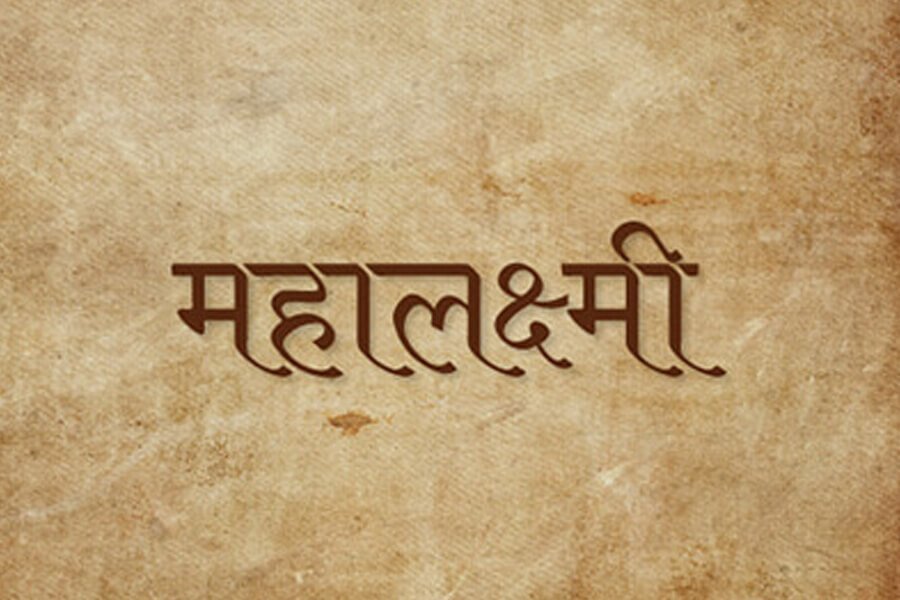The Metaphor of Deepavali
Deepavali, or Diwali as commonly known, will be celebrated on the 12th of November this year. What is the inner, or spiritual, significance of Diwali in Sanatan Dharma? An excerpt from Partho's latest book.

Our homage to the Divine Mother for this Navaratri
Wisdom and Force are not the only manifestations of the supreme Mother; there is a subtler mystery of her nature and without it Wisdom and Force would be incomplete things and without it perfection would not be perfect. Above them is the miracle of eternal beauty, an unseizable secret of divine harmonies, the compelling magic of an irresistible universal charm and attraction that draws and holds things and forces and beings together and obliges them to meet and unite that a hidden Ananda may play from behind the veil and make of them its rhythms and its figures.
This is the power of MAHALAKSHMI and there is no aspect of the Divine Shakti more attractive to the heart of embodied beings. Maheshwari can appear too calm and great and distant for the littleness of earthly nature to approach or contain her, Mahakali too swift and formidable for its weakness to bear; but all turn with joy and longing to Mahalakshmi. For she throws the spell of the intoxicating sweetness of the Divine: to be close to her is a profound happiness and to feel her within the heart is to make existence a rapture and a marvel; grace and charm and tenderness flow out from her like light from the sun and wherever she fixes her wonderful gaze or lets fall the loveliness of her smile, the soul is seized and made captive and plunged into the depths of an unfathomable bliss. Magnetic is the touch of her hands and their occult and delicate influence refines mind and life and body and where she presses her feet course miraculous streams of an entrancing Ananda.
And yet it is not easy to meet the demand of this enchanting Power or to keep her presence. Harmony and beauty of the mind and soul, harmony and beauty of the thoughts and feelings, harmony and beauty in every outward act and movement, harmony and beauty of the life and surroundings, this is the demand of Mahalakshmi. Where there is affinity to the rhythms of the secret world-bliss and response to the call of the All-Beautiful and concord and unity and the glad flow of many lives turned towards the Divine, in that atmosphere she consents to abide.
But all that is ugly and mean and base, all that is poor and sordid and squalid, all that is brutal and coarse repels her advent. Where love and beauty are not or are reluctant to be born, she does not come; where they are mixed and disfigured with baser things, she turns soon to depart or cares little to pour her riches. If she finds herself in men’s hearts surrounded with selfishness and hatred and jealousy and malignance and envy and strife, if treachery and greed and ingratitude are mixed in the sacred chalice, if grossness of passion and unrefined desire degrade devotion, in such hearts the gracious and beautiful Goddess will not linger. A divine disgust seizes upon her and she withdraws, for she is not one who insists or strives; or, veiling her face, she waits for this bitter and poisonous devil’s stuff to be rejected and disappear before she will found anew her happy influence.
Ascetic bareness and harshness are not pleasing to her nor the suppression of the heart’s deeper emotions and the rigid repression of the soul’s and the life’s parts of beauty. For it is through love and beauty that she lays on men the yoke of the Divine. Life is turned in her supreme creations into a rich work of celestial art and all existence into a poem of sacred delight; the world’s riches are brought together and concerted for a supreme order and even the simplest and commonest things are made wonderful by her intuition of unity and the breath of her spirit. Admitted to the heart she lifts wisdom to pinnacles of wonder and reveals to it the mystic secrets of the ecstasy that surpasses all knowledge, meets devotion with the passionate attraction of the Divine, teaches to strength and force the rhythm that keeps the might of their acts harmonious and in measure and casts on perfection the charm that makes it endure for ever.
Extracted from Sri Aurobindo’s book, The Mother, in which he describes the nature, character and role of the Divine Mother. This book was written in the 1930s to his direct disciples living with him in his ashram.
The paragraph format has been slightly altered by the editors for convenience of reading. — Ed.
Seer, poet and writer, unarguably one of the profoundest influencers of human thought and civilization in the last century, Sri Aurobindo is widely known and revered as a Maharishi and Mahayogi. He left his body in Pondicherry on December 5, 1950.
Deepavali, or Diwali as commonly known, will be celebrated on the 12th of November this year. What is the inner, or spiritual, significance of Diwali in Sanatan Dharma? An excerpt from Partho's latest book.
The first of a four part series on Vedanta from Swami Vivekananda’s famous ‘Calcutta address on Vedanta’ delivered in Calcutta on January 19, 1897. This talk marks a significant moment in Swamiji’s life and is considered one of his most important speeches on Vedanta, where he explains some significant aspects of Sanatan Dharma
A series of conversations on Sanatan Dharma and Vedanta between our editors, Dr Singh and Partho. This is the first conversation in the series, describing the initial process of Vedanta

